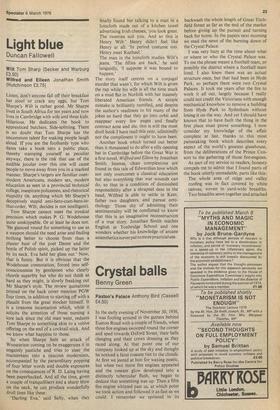Light blue
Duncan Fallowell
Wilt Tom Sharp (Secker and Warburg £3.50) Wilfred and Eileen Jonathan Smith (Hutchinson £3.75)
Listen, don't anyone fall off their breakfast bar stool or crack any eggs, but Tom Sharpe's Wilt is rather good. Mr Sharpe lived in South Africa for ten years and now lives in Cambridge with wife and three kids. Hilarious. He dedicates the book to apprenticed butchers. Side-splitting. There is no doubt that Tom Sharpe has the uncommon talent for making people laugh aloud. If you are the foolhardy type who dares take a book into a public place, thereby stamping yourself as peculiar anyway, there is the risk that use of the audible jocular over this one will cause people to move away from you in a marked manner. Sharpe's targets are familiar ones: modern Americans, modern sex, modern education as seen in a provincial technical college, inaspirate policemen, and rhetorical stupidity (ie. anything which Mr Sharpe's deceptively stupid anti-hero-cum-hero-inthat-order, Wilt, decides is not intelligent).
Tom Sharpe cannot meet the ironical precision which makes P. G. Wodehouse quite unskippable. Or at least he does not. 'He glanced round for something to use as a weapon should the need arise and finding nothing better to choose from than a Plaster bust of the poet Dante and the bottle of Polish spirit, picked up the latter by its neck. Eva held her glass out.' Now, that is funny. But it is obvious that the Wodehouse connotation, forced into selfconsciousness by gentlemen who clearly chortle superbly but who do not think as hard as they might, is slowly freaking out Mr Sharpe's style. The review quotations printed on the back cover mention PGW four times, in addition to starting off with a plaudit from the great mocker himself. It is a tiresome incantation which, while it solicits the attention of those nursing a sore lack since the old man went, reduces Tom Sharpe to something akin to a votive offering on the end of a cocktail stick. And we know what happens to those.
So when Sharpe feels an attack of Woosterism coming on he exaggerates it in ungainly pastiche and tries to steer the mainstream into a raucous modernism, accompanied by the paramilitary popping of four letter words and double exposures on the consequences of R. D. Laing having been paperbacked. And all the time, given a couple of tranquillisers and a sharp blow on the neck, he can produce wonderfully droll lines like these: 'Darling Eva,' said Sally, when they finally found her talking to a man in a loincloth made out of a kitchen towel advertising Irish cheeses, 'you look great. The twenties suit you. And so this is Henry Wilt.' Henry didn't feel like Henry at all. 'In period costume too. Henry meet Raphael.'
The man in the loincloth studies Wilt's jeans. 'The fifties are back,' he said languidly, 'I suppose it was bound to happen.'
The story itself centres on a conjugal murder that wasn't, for which Wilt is given the rap while his wife is all the time stuck on a mud flat in Norfolk with her insanely liberated American friends. A simple mistake is brilliantly ramified, and despite the author's readiness to hit many of the jokes so hard that they go into orbit and reappear every few pages and finally contract acne and die, this is still the most droll book I have read this year, admittedly not the compliment it ought to have been.
Another book which turned out better than it threatened to do after a silly opening bat in Cambridge before the Great War is a first novel, Wilfred and Eileen by Jonathan Smith. Intense, clean complexions are found in this tale of Edwardian love which not only overcomes a classical education but also everything that war wounds can do, so that in a condition of diminished responsibility after a shrapnel dent in the head, Wilfred is able to settle in Kent, father two daughters, and pursue ornithology. Those shy of admitting their sentimentality will be comforted to know that this is an imaginative reconstruction of a true story. Jonathan Smith teaches English at Tonbridge School and one wonders whether his knowledge of arcane anaesthetics is ever put to more practical use.


































 Previous page
Previous page